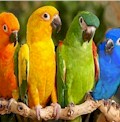One bit of parrot information they did have was that Baby Macaw can be expected to live as long as a human. His baby years will be very important if you want to have a happy, healthy adult Macaw.
Preparing for Baby Macaw
If you were bringing home a human baby, you would try to prepare the nursery ahead of time. You should do the same for Baby Macaw.
Those in the know on parrot information advise that you hand-raise Baby Macaw, being careful not to spoil him. He will learn to scream loudly at you if you spoil him! Teach him to trust people, to bond with your family, and to learn house rules.
Parrot information books also recommend that you provide the following:
![]() A large, high cage with heavy duty bars – minimum size is 24” x 36” x 36” high (about 61 x 91 x 91 centimeters)
A large, high cage with heavy duty bars – minimum size is 24” x 36” x 36” high (about 61 x 91 x 91 centimeters)
![]() Several sturdy toys – strong wood, leather, Plexiglas, etc.
Several sturdy toys – strong wood, leather, Plexiglas, etc.
![]() Hand-feeding nutritional food
Hand-feeding nutritional food
![]() Lots of play time with you
Lots of play time with you
Setting up Baby Macaw’s Living Quarters
One very important piece of parrot information is that you should place the cage in the corner of the room to make Baby Macaw feel safe. The room should be kept at a temperature of at least 68 degrees F (38 degrees C). A young parrot needs more warmth than a parrot that has passed its first birthday.
Specific Parrot Information
General parrot information is good for all baby parrots, but you will want specific parrot information for Baby Macaw. His needs that differ from other parrots can include food, bedding, and socializing.
Be sure you get the parrot information on what to expect from Baby Macaw. Learn about its coloring, how well it will enjoy playing with people, and how well it may talk.
Parrot Information on Handling
Most pet stores, including those online, should have parrot information on handling Baby Macaw. Your baby will like being handled each day. Birds are flock creatures, and need to be part of a group. You are important to him.
Handle him when you feed him – and handle him between feedings. Make it a playtime, but keep it quiet at first when your baby is adjusting to his new home. Fifteen minutes at a time, in a quiet room works best.
Parrot Information on Feeding
Your mall pet store may not have the latest parrot information on feeding your baby. Hopefully, they will tell you to be careful of its feeding. Find the most nutritional food for young macaws. If you must change his diet at some point, do it gradually to avoid upsetting his stomach.
Parrot Information on Talking
You will be eager to hear your little macaw talk, of course. Most parrot information books agree that this will likely happen sometime after he turns a year old. Don’t wait to encourage him, though. Talk to him from the day you bring him home. Let him learn to know your voice. Help him understand a few words that you really want him to say someday. Be careful NOT to say the words you don’t want to hear from him!
Speak clearly to your parrot. When he begins making noises that sound a little like words, repeat the words so he can hear them pronounced correctly and in a pleasant tone.
Parrot Information on Daily Schedule
It will be important to get your baby into a schedule. Like human babies, parrots need to have regular times to wake, eat, play, and sleep. Don’t be surprised to see your little one nod off during the day.
Decide before you bring Baby Macaw home how you will handle nights.
![]() Will you cover the cage every night to tell him it is bedtime?
Will you cover the cage every night to tell him it is bedtime?
![]() Will you just turn off the lights in his room at bedtime?
Will you just turn off the lights in his room at bedtime?
![]() Will you leave a night light on for him?
Will you leave a night light on for him?
Whatever you decide, be consistent from the first day – and do it at the same time each night.
Get and follow proper parrot information, and you can raise a baby macaw into a loving, life-long companion.
